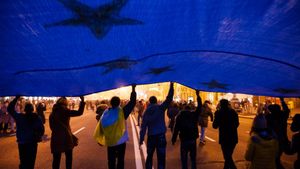The results of the 2025 German Federal Election, held on February 23, marked a significant shift in the country's political scene, as the conservative Christian Democratic Union (CDU) and its sister party, the Christian Social Union (CSU), emerged victorious, paving the way for Friedrich Merz to likely become the next Chancellor. According to provisional results, the CDU/CSU coalition secured 28.6 percent of the vote, compared to 20.8 percent for the far-right Alternative for Germany (AfD), which has seen unprecedented support amid rising anti-immigrant sentiments. The Social Democratic Party (SPD), which was previously led by Olaf Scholz, suffered a notable decline, finishing third with just 16.4 percent of the vote, something Scholz described as "a bitter defeat," taking personal responsibility for the poor showing of his party. Meanwhile, the left-wing Die Linke party also fared relatively well, achieving 8.8 percent, nearly doubling its share from the last election.
The election's high turnout rate of 84 percent is the highest seen since reunification, indicating strong public interest as voters decided the future direction of the country. With the CDU/CSU coalition projected to regain 208 seats and the AfD 152, political analysts note the shifting dynamics within Germany's parliament, the Bundestag, and the possibility of increased tensions as far-right ideologies gain traction.
Friedrich Merz, known for his strong social conservative stance and his business background, promises to revive Germany’s economic standing, limit immigration, and bolster support for Ukraine. During this election, he emphasized the urgent necessity of forming the next government, stating, "the world will not wait for us [Germany]." His agenda also highlights aspirations for European independence from U.S. foreign influence, emphasizing the need for Europe to take the lead on various geopolitical matters, particularly as tensions increase due to the conflict stemming from Russia's invasion of Ukraine.
"If it winds up being a coalition with two parties – with Merz and CDU, and the centre left – it puts him [Merz] in a stronger position," noted Marco Vicenzino, Global Strategy Adviser, highlighting the possibility of stabilizing the new government against the backdrop of pressure for rapid coalition negotiations amid significant European challenges.
The AfD's rise to prominence is notable; it marks the strongest showing of nationalist sentiment since World War II, positioning the party firmly within the mainstream political discourse at the national level. Following the election, AfD leaders such as Tino Chrupalla claimed victory, stating, "We have achieved something historic today," and suggested they should be represented within the new coalition government, setting the stage for possible conflicts as other parties align themselves with or against their policies.
Looking at the left, Die Linke has faced internal conflicts recently but managed to retain representation compared to previous elections. Under the guidance of veteran politicians like Gregor Gysi, the party has sought to recommit to core issues of social justice, educational equity, and addressing the challenges posed by regional disparities between East and West Germany. Gysi mentioned the importance of this renewed focus to counter the rise of the AfD and cautioned against neglecting worker issues, reflecting on the party's historical criticisms.
International responses have flooded in, particularly from Ukraine where President Volodymyr Zelenskyy lauded the election results, stating, "A clear voice from the voters, and we see how important this is for Europe." He emphasized his anticipation of continued support for Ukraine from the upcoming German government as it navigates complex relations with both Russia and the West.
Meanwhile, the newly established Sahra Wagenknecht Alliance, formed from disillusioned members of Die Linke, fell just short of the threshold needed for parliamentary representation. This has drawn attention to the political fragmentation on the left and raised questions about the efficacy of leftist unity, particularly concerning challenges with the SPD, who also reiterated the need for introspection following their electoral losses.
Overall, the political balance of power within Germany is under transformation, as new dynamics emerge among traditional parties and right-wing movements. Merz's promise to unite Germany and strengthen its international stance may be put to the test as he attempts to form a government and address pressing domestic and foreign policy challenges. The political limbo resulting from this election could significantly impact future governance, with international observers closely watching how Germany's next leadership will respond to its regional responsibilities.



